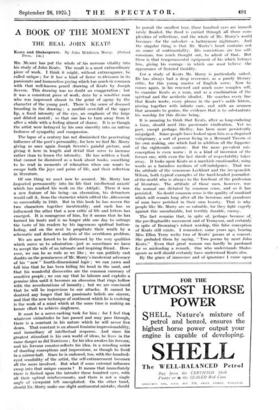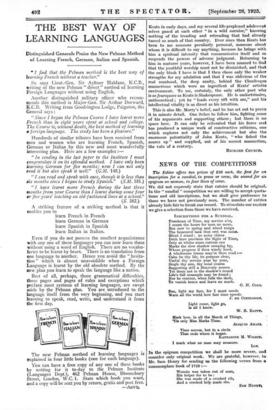A BOOK OF THE MOMENT
THE REAL JOHN KEATS
Keats and Shakespeare. By John Middleton Murry. (Oxford Press. 14s.)
MR. MURRY has put the whole of his nervous vitality into his study of John Keats. The result is a most extraordinary piece of work. I think it might, without extravagance, be called unique ; for it has a kind of fierce restlessness in its passionate and humourless prying which has much in common with that well-known pencil drawing of Keats by Joseph Severn. This drawing was no doubt an exaggeration but it was a consistent piece of work, done by a sensitive man who was impressed almost to the point of agony by the character of the young poet. There is the sense of diseased brooding in the drawing ; a morbid over-fall of the upper lip, a fixed intensity of the eye, an emphasis of the large and dilated nostril ; so that one has to turn away from it after a while with a feeling almost of shame. It is as though the artist were betrayed by his own sincerity into an untrue lushness of sympathy and compassion.
The lapse of a century has not diminished the penetrating influence of the poet's personality, for here we find Mr. Murry giving us once again Joseph Severn's painful picture, and giving it here in length and detail that serve to increase rather than to lessen the intensity. He has written a book that cannot be dismissed as a book about books, something to be read in moments of relaxation when one wants to escape both the joys and pains of life, and their reflection in literature.
Of one thing we must now be assured. Mr. Murry has imported permanently into his life that intellectual naivete which has marked his work on the Adelphi. There it was a new feature of his being—an aberration, his detractors would call it, from the character which edited the Athenaeum so successfully in 1920. But in this book he has woven the two characters together inextricably, and each has so influenced the other that a new critic of life and letters has emerged. It is courageous of him, for it means that he has burned his boats and is no longer able one day to outrage the taste of his readers by his ingenuous spiritual button- holing, and on the next to propitiate their wrath by a schematic and detached analysis of the overblown problem.
We arc now forced to be distressed by the very qualities which move us to admiration—just as sometimes we have to accept the wife of an intimate and inspiring friend. How- ever, we can be as rude as we like ; we can publicly cast doubts on the genuineness of Mr. Murry's incoherent advocacy of his " new " fourth-dimensional logic ; we can yawn and tell him that he has been hiding his head in the sand, and that his wonderful discoveries are the common currency of sensitive people ; we can say that he labours and exploits a genuine idea until it becomes an obsession that rings hollow with the reverberations of insanity ; but we are convinced that he will be impervious to our attacks. It cannot be doubted any longer that his passionate beliefs are sincere, and that the new technique of sentiment which he is evolving is the work of a mind which at the same time is making an heroic effort to achieve singleness.
It must be a- nerve-racking task for him : for I feel that whatever vicissitudes he has passed and may pass through, there is a constant in his nature which he will never live down. That constant is an almost feminine impressionability, and immediacy of intellectual response. - And since his greatest stimulant is his own world of ideas, he lives in the same danger as did Narcissus ; for his idea awakes his fervour, and his fervour counter-reflects his idea, in a receding series of dazzling conceptions and impressions, as though he lived in a mirror-hall. Since he is endowed, too, with the hundred- eyed sensibility of the artist, the self-entrancement becomes all the more involved. But what if some external influence creep into that unique camera ? It means that immediately there is flashed upon the intruder these hundred eyes, with all their optical reinforcements, and there is not a single angle of viewpoint left unexploited. On the other hand, &tumid Mr. Murry make one slight sentimental mistake, should
he permit the smallest tear, those hundred eyes arc immed- iately flooded, the flood is carried through all those com- plexities of reflections, and the whole of Mr. Murry's world becomes--for the onlooker—a lachrymose nightmare. And the singular thing is that Mr. Murry's heart contains not
an ounce of sentimentality. His convictions are too self- conscious, too much thought out, to admit of that. But there is that temperamental equipment of his which betrays him, giving his courage-- in which one must believe--the appearance of frenzied timidity.
For a study of Keats Mr. Murry is particularly suited. He has always had a deep reverence, as a purely literary critic, for this young master of English verse. Now he comes again, in his renewed and much more complex self, to examine Keats as a man, and as a combination of the spiritual and the aesthetic idealist. He searches every line that Keats wrote, every phrase in the poet's noble letters, piecing together with infinite care, and with an acumen that amounts to genius, the evidence that is to substantiate his worship for this divine being.
It is amazing to think that Keats, after so long-enduring a fame, should need this passionate vindication. Yet no poet, except perhaps Shelley. has been more persistently misjudged. Some people have looked upon him as a disguised voluptuary, a sort of poseur living in a Mermaid Tavern of his own making, one which had in addition all the fopperies of the eighteenth century. But the more prevalent mis• conception is even worse : it is a kind of inversion of the former one, with even the last shreds of respectability take!' away. It looks upon Keats as a mawkish emotionalist, usinp words as a harmless medium of self-indulgence. That was the attitude of the venomous Lockhart and the irresponsible Wilson, both typical examples of the hard-headed journalist- of-the-world who is always to the forefront of the profession of literature. The attitude of those men, however, was the normal one dictated by common sense, and so it has persisted. No doubt common sense is the quality of mankind which will remain long after all the heroisms and grandeurs of man have perished in their own beauty. That is why people like Mr. Murry are so valuable, for they fight eagerly against this unendurable, but terribly durable, enemy.
The fact remains that, in spite of, perhaps because of, the pre-Raphaelite movement and of Tennyson, and certainly in spite of Browning's robust worship, this false conception of Keats still exists. I remember, some years ago, hearing Miss Ellen Terry recite two of Keats' poems at a concert. She preluded them by saying, " Two poems by sweet John Keats." Even that great woman can hardly be pardoned for so misleading a remark. One who understands Shake- speare so well should certainly have understood Keats also.
By the grace of innocence and of ignorance I came upon
Keats in early days, and my several life-perplexed adolescent selves gazed at each other " in a wild surmise," knowing nothing of the treading and retreading that had already tamed so much of that country. Ever since then Keats has been to me someone peculiarly personal, someone about whom it is difficult to say anything, because he brings with him a spiritual intensity that communicates itself and se suspends the powers of adverse judgment. Returning to him in maturer years, however, I have been amazed to find that the youthful worship must not be diminished, and that the only blush I have is that I then chose only the weaker strengths for my adulation and that I was oblivious of the real manhood, the deep sanity, behind the Claudesque mannerisms which were an ingredient of Keats' artistio environment. To me, certainly, the only other poet who is as foursquare as Keats is Shakespeare. He is undoctrinaire, untheoretical ; yet he " loads every rift with ore," and his intellectual vitality is as direct as his intuition.
This is also Mr. Murry's belief, and he has set out to prove it in minute detail. One itches to follow him, fighting some of his arguments and supporting others ; but there is no space here. It can only be reiterated that his fierce zeal has produced a unique work of constructive criticism, one which explores not only the achievement but also the enormous potentiality of John Keats, " who fished the murex up " and supplied, out of his merest mannerism, the vats of a century.
Rrenaan CHURCH.



















































 Previous page
Previous page